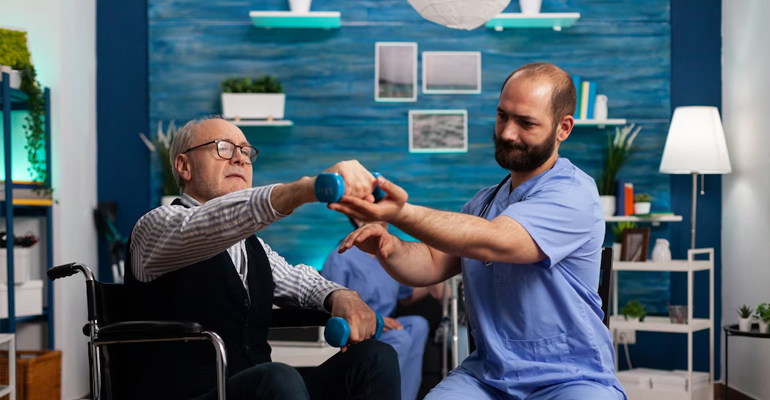Neuro Rehabilitation

Restoring strength and mobility after injuries or surgeries is key to regaining independence and improving quality of life. Our expert physiotherapy care uses personalized exercises, stretches, manual therapy, and advanced techniques to promote healing and restore function. Whether recovering from surgery or injury, we ensure a safe, gradual recovery, helping you regain confidence and return to daily activities with ease.
-
Stroke
Stroke can lead to weakness, paralysis, and loss of coordination, affecting movement and daily activities. Physiotherapy focuses on neurorehabilitation, muscle strengthening, balance training, and mobility exercises to help regain function and improve independence.
-
Multiple Sclerosis (MS)
MS is a progressive neurological disorder that affects movement, coordination, and muscle control. Physiotherapy helps manage symptoms by improving strength, balance, flexibility, and endurance while addressing fatigue and mobility challenges to enhance overall function.
-
Parkinson's Disease
Parkinson's affects movement due to a decline in dopamine levels, leading to tremors, stiffness, and balance issues. Physiotherapy helps improve mobility, posture, gait, and coordination through targeted exercises, balance training, and movement re-education.
-
Bell's Palsy
Bell's Palsy causes temporary facial paralysis due to nerve inflammation. Physiotherapy focuses on facial muscle exercises, massage, and stimulation techniques to restore movement, improve muscle tone, and enhance facial symmetry.
-
Traumatic Brain Injuries (TBI)
TBI can cause cognitive, motor, and sensory impairments. Physiotherapy plays a crucial role in rehabilitation by improving mobility, coordination, balance, and strength while addressing cognitive and functional challenges to enhance recovery.
-
Spinal Cord Injuries (SCI)
SCI can result in partial or complete loss of motor function below the injury site. Physiotherapy focuses on muscle re-education, strength training, mobility exercises, and assistive device training to maximize independence and improve quality of life.
-
Neuropathy
Neuropathy causes nerve damage leading to weakness, numbness, and pain. Physiotherapy helps manage symptoms through balance training, muscle strengthening, and sensory re-education to improve function and prevent complications.
-
Muscular Dystrophy
Muscular dystrophy is a genetic disorder causing progressive muscle weakness. Physiotherapy aims to maintain mobility, improve strength, and delay muscle deterioration through controlled exercises, stretching, and assistive therapy.
-
Dystonia
Dystonia is a movement disorder causing involuntary muscle contractions and abnormal postures. Physiotherapy helps manage symptoms through stretching, posture correction, relaxation techniques, and neuromuscular retraining to enhance movement control.
-
Guillain-Barré Syndrome (GBS)
GBS is an autoimmune condition causing sudden muscle weakness and paralysis. Physiotherapy focuses on gradual strength rebuilding, mobility exercises, and respiratory support to aid in recovery and restore independence.
-
Cognitive Rehabilitation
Cognitive rehabilitation helps individuals with brain injuries, neurological conditions, or memory disorders regain thinking, problem-solving, and communication skills. Physiotherapy integrates motor and cognitive exercises to enhance function, independence, and overall well-being.
